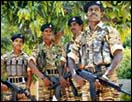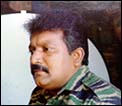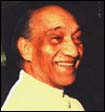The Rediff Special/J N Dixit
'The feeling in New Delhi was that the LTTE had to be neutralised, whatever the scale of the operation'
 As the impasse over the constitution of the interim administration council developed and as senior figures in Jayewardene's government stepped up their intrigues to sabotage the Indo-Sri Lanka agreement, the LTTE undertook a clandestine arms smuggling operation, which provided a timely handle to the Sri Lankan government to question the implementability of the agreement.
As the impasse over the constitution of the interim administration council developed and as senior figures in Jayewardene's government stepped up their intrigues to sabotage the Indo-Sri Lanka agreement, the LTTE undertook a clandestine arms smuggling operation, which provided a timely handle to the Sri Lankan government to question the implementability of the agreement.
A group of senior LTTE cadres under the command of the LTTE leader Pulendran were apprehended by the Sri Lankan navy in the Palk Straits with a boatload of arms and ammunition. This confirmed the suspicion that the LTTE was moving some of its stocks from Tamil Nadu to the eastern coast near Trincomalee. The objective was to stockpile some portion of the weapons in secret places and to distribute the balance to LTTE cadres. This was in clear violation of the provisions of the Indo-Sri Lanka agreement.
Seventeen members of the LTTE led by and including Pulendran were brought to the Palaly airbase and kept under military custody by the Sri Lankan forces. Lalit Athulathmudali and Premadasa told President Jayewardene that these LTTE cadres should be brought to Colombo for trial and given appropriate punishment for having violated the Indo-Sri Lanka Agreement and for continuing military rebellion against the Sri Lankan state. Lalit also kept telling Jayewardene that an example should be made of Pulendran as he was the leader of the LTTE squad which had killed 126 bus commuters at Habarana and Kithulotowa in April 1987. Orders were issued to the Sri Lankan brigadier commanding the Palaly base, Jayaratne, to send to Colombo these cadres for whom a special plane was being sent.
When the incident took place between October 2 and 3, I was away in Delhi reporting on my discussions with Prabhakaran and about the difficulties in constituting an interim administrative council when news of the capture of the LTTE cadres reached me. I reported the matter to Rajiv Gandhi who told me to return at once to Colombo to try to defuse the situation. Soon after reaching Colombo in the evening of October 3, I rang up the IPKF commander and requested him to take all appropriate military steps to safeguard the LTTE cadres and to prevent them from being brought to Colombo. I told him that he should take control of the Palaly airbase fully with Indian troops till the matter was sorted out.
General Harkirat Singh's reply was that I did not figure in his chain of command. He said I should send my request to the ministry of external affairs, which would tell the defence ministry which, in turn, would speak to army headquarters which would then ask the GOC-in-C, Southern Command, to send necessary orders to him. Harkirat Singh said he would only accept orders from the GOC-in-C, Southern Command in this matter.
I told him that while I was in the process of sending the necessary messages to the ministry of external affairs, time may run out, and that if he waited to protect the LTTE cadres till he received orders through proper channels, the Sri Lankan government will transport these cadres to Colombo forcibly, which would result in a major political crisis. Being a disciplined soldier, the general was quite clear in his mind that he would only accept orders from proper channels. He was unwilling to acknowledge and perform his role in a politically unpredictable situation. This in spite of my assuring him that I would take full responsibility for his actions if he accepted my advice.
I sent the required messages to Delhi and rushed to President Jayewardene. In an hour-long meeting, I pleaded with him that he should not bring the LTTE cadres to Colombo and that Pulendran and his colleagues should be shifted to the custody of the Indian armed forces and that we would sort out the violation of the Indo-Sri Lanka agreement later when tempers cooled down.
 Jayewardene agreed to stop Lalit from bringing the LTTE cadres to Colombo. He asked me to tell the IPKF commander to take over the custody of these cadres, while he was sending the instructions to Lalit in the matter. Lalit anticipated my hurried return from Delhi to Colombo and the likelihood of Jayewardene thwarting his plans to create a crisis and took perniciously pre-emptive action. He had sent the plane to Palaly airbase in the afternoon of October 4, or the morning itself, with orders to Brigadier Jayaratne that he should forcibly move Pulendran and 16 other LTTE cadres to Colombo.
Jayewardene agreed to stop Lalit from bringing the LTTE cadres to Colombo. He asked me to tell the IPKF commander to take over the custody of these cadres, while he was sending the instructions to Lalit in the matter. Lalit anticipated my hurried return from Delhi to Colombo and the likelihood of Jayewardene thwarting his plans to create a crisis and took perniciously pre-emptive action. He had sent the plane to Palaly airbase in the afternoon of October 4, or the morning itself, with orders to Brigadier Jayaratne that he should forcibly move Pulendran and 16 other LTTE cadres to Colombo.
In the period between October 3 and 5, the IPKF persuaded the Sri Lankan authorities to allow some LTTE leaders to visit Pulendran and the 16 other detainees to give them food and some medicines. Sri Lankan military officers agreed to this reluctantly. The LTTE representatives led by Mahatya visited Pulendran and his group and while giving them food and medicines also passed on cyanide capsules.
On my return from the meeting with Jayewardene I again conveyed a message to the IPKF headquarters to take over the custody, if necessary by force, of the LTTE cadres. Harkirat Singh's response remained procedural. Sri Lankan army personnel tried to forcibly take Pulendran and other members of his group to the special military plane which was sent by Lalit. But Pulendran and his colleagues swallowed the cyanide pills. All of them died.
Prabhakaran then declared that the relevance of the Indo-Sri Lanka Agreement stood substantially negated with the death of his senior colleague Pulendran and his other followers. He also conveyed the message that he was not interested in participating in the political processes aimed at establishing an interim administrative council.
The process of confrontation with the LTTE had begun. Prabhakaran, who used to visit Harkirat Singh's headquarters often, stopped interacting with the IPKF. The levels of angry demonstrations against the IPKF increased. The culmination of this process saw the LTTE killing five or six Indian soldiers while they were returning from Jaffna city to their base on October 6 or so. A critical situation was developing. The then chief of the army staff General K Sunderji reached Jaffna on October 5 on an inspection and fact-finding visit. The LTTE action in declaring a pullback from Indo-Sri Lanka Agreement and the killing of Indian soldiers prompted the Government of India to launch military operations against the LTTE.
 General Sunderji ordered the commencement of what is known as 'Operation Pawan' on October 6, 1987. The then GOC-in-C, Southern Command of the Indian army, Dipender Singh, has been quoted as
having opposed the operations against the LTTE. There have also been reports that he tried to use his political contacts and the Tamil Nadu government to persuade Rajiv Gandhi not to launch the operations against the LTTE.
General Sunderji ordered the commencement of what is known as 'Operation Pawan' on October 6, 1987. The then GOC-in-C, Southern Command of the Indian army, Dipender Singh, has been quoted as
having opposed the operations against the LTTE. There have also been reports that he tried to use his political contacts and the Tamil Nadu government to persuade Rajiv Gandhi not to launch the operations against the LTTE.
I have no direct knowledge of these exchanges. The point of view I expressed at that time was that since the LTTE had pulled back from the agreement, and had initiated widespread violence including killing of Indian soldiers, a limited operation to neutralise these inclinations of theirs would be in order.
The feeling in New Delhi, however, was that the LTTE had to be neutralised, whatever the scale of the operation. The Research and Analysis Wing of the Cabinet Secretariat as well as some Tamil groups indicated that a message of firmness had to go out to the LTTE. This was the approach on which Rajiv Gandhi's policies were based whatever inner differences might have been in the system.
Excerpted from Assignment Colombo, by J N Dixit, Konarak Publishers, 1998, Rs 400, with the publisher's permission.Readers interested in obtaining a copy of the book may direct their enquiries to Mr K P R Nair, Konarak Publishers, A-149, Main Vikas Marg, New Delhi 110 001.
Tell us what you think of this feature
|



